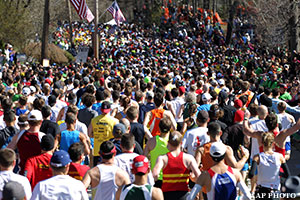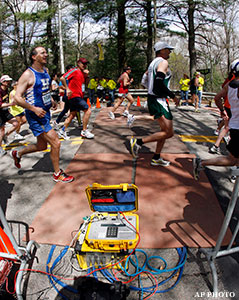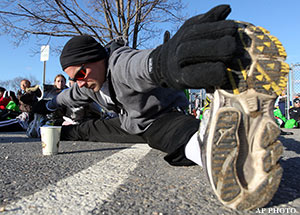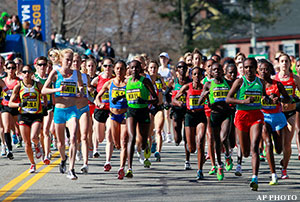
Sub three hours, ten minutes. Sub three hours, forty minutes. For years, these were the respective marathon times that male and female runners had engrained in their heads for Boston Marathon qualification. Complete a marathon on an approved course under these time parameters (adjusted upwards with age), and you had an entry to participate in the annual Patriots Day party in Boston.
Times have changed. Just achieving those "qualifying" times doesn't mean you can necessarily make arrangements to line up at Hopkinton on the third Monday of April with 25,000 others and try to continue to the finish line on Boylston Street.
Unlike your local marathon or even larger ones in New York, Chicago or Los Angeles that register in excess of 45,000 runners each year, Boston is more selective. You cannot just sign up or pay an excessive fee (celebrities and other special exemptions aside) to run Boston. The official field is roughly 27,000, with 20,000 designated for the qualifiers, and the competition for those slots is intensifying.
"Have you run Boston?" ... "The next marathon you should do should be Boston, I've heard it's the best." Nothing signals a lack of running knowledge to someone trying for Boston qualification more than hearing those remarks. (Perhaps only thing more sophomoric is the classic, "How far was this marathon?") All joking aside, before 2011, as long as you had a qualifying time, you were -- barring extreme procrastination to register for the race -- able to run in the next Boston Marathon.
This process dramatically changed when spots in the 2011 race filled up in just eight hours. It wasn't enough to just to be fast on the marathon course. You had to beat others to the computer keyboard for the online registration.

"I ran a 3:06 and finally qualified after coming so close before, but could not get to my computer fast enough on that day," one disappointed runner said. "Game over for me. I was devastated."
Part of the attraction for Boston marathoners is the thrill of qualifying to race the same route and famous hills that legends Bill Rodgers, Alberto Salazar, Roberta Gibb and others have conquered. Despite the spots filling up so quickly for 2011, the Boston Athletic Association made no special exceptions and stuck with its first-come, first-serve process.
There was additional uproar on message boards and running blogs as 3:02 qualifiers were excluded while 3:09 qualifiers of similar age received entry simply because they had logged in early enough in the day.
With so many qualified runners being denied an entry, race officials were smart enough to realize they had an issue on their hands and responded by ... making the qualification standards harder.
The change for the 2012 race allowed faster qualifiers to register at an earlier enrollment date, thus eliminating the sprint get online and headaches of system crashes and website overloads.
On the first day of registration, only those runners with qualifiers that were 20 minutes or faster than the qualifying times were eligible.
Then two days later, those with times 10 minutes or faster than the qualifying times could register. Two days after that, those with times five minutes faster could do it.
And three days after that, anyone with a qualifying time could register, but no one in this phase is guaranteed a spot in the race.
Additionally, the qualifying times for 2013 get even tougher, with the top-tier times of 3:10 and 3:40 dropping to 3:05 and 3:35, respectively.

So is this a good solution?
Legendary Boston Marathoners Dick Hoyt and Bill Rodgers both think so. "You need to reward the faster runners," Hoyt said. Before last year's race, Rodgers put it a bit more directly, saying, "I'm not against having 27,000 people in the race, but let's not lose the excellence. It's not a walk-run. It's a gem, like The Masters. It should stand apart."
Hoyt and his son Rick will be lining up for their 30th Boston Marathon this year. Rick has cerebral palsy, and Dick pushes him a wheelchair. When the Hoyt sought entry in the 1981 Boston Marathon, they were denied because they hadn't posted a qualifying time. And the additional catch was that their qualifying time would be based on Rick's age rather than his dad's -- a gap of nearly 22 years. At the time that meant qualifying in 2 hours, 50 minutes.
"We lined up as a bandit in those days," Dick said.
While stealth entry is increasingly frowned upon in today's running culture, Boston organizers typically looked the other way and allowed runners without numbers to start in the back of the pack and run the marathon if they wanted. Dick's running career had only started four years earlier at the age of 37, but he pushed Rick a very respectable 3:18 time in 1981, followed by a 2:59 and 2:58 the following years. Still not good enough and no waiver was granted by BAA.
"The harder it is, the better we are" is the outlook that Dick and Rick have taken through their countless marathons, six Ironman Triathlons and running and bike tours across the whole United States. "After '83 and being denied entry, we sought out the fastest, flattest course to try to qualify and found that in the Marine Corps marathon in Washington D.C.," Dick said. Together, they finished that 26.2-mile journey in 2:45, gaining their official entry ticket to Boston.

They later posted a personal best of 2:40, which would put you in about the top 3 percent of the Boston qualified field.
So has BAA solved the problem in as little as one year? Not exactly, although the feedback seems tempered and, dare we say, accepted. Debates will continue as in the past about the difference in male and female qualification times, course conditions and composition. But one item has been forfeited: The thrill of qualifying.
Ask any former Boston marathoner the race they ran to first qualify, and they will recite the date, time, weather, and clothing attire to you verbatim. This is largely because most qualify with only a few minutes or even seconds to spare. "When I crossed the finish line at 3:37 with my girlfriends, the race announcer informed the crowd that we were all heading to Boston," said Amy Becker of Atlanta regarding the feeling when you qualify for Boston. "The moment was truly special for all of us, and one I'll always remember."
Now that jubilation and celebration that occurs at that specific race site is tempered if not replaced with the worry of getting that email from BAA to say their time was fast enough -- and accepted for registration.
Fair to say, that the feeling is not quite the same. Then again, a little controversy is good and should be expected though in any elite athletic event. (BCS formulas or NCAA basketball selection committee, anyone?)
Popular Stories On ThePostGame:
-- The Hottest New Running Trend
-- The Best Workout You're Not Doing
-- Baseball-Themed Beers
-- 'Jewball' -- A Novel By Neal Pollack (Excerpt)








